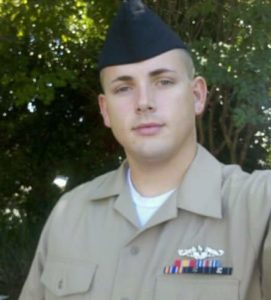Tyler Dixon
Still Delivering on His Mission
Still Delivering on His Mission
A few years ago Tyler Dixon was sitting in his vehicle in between appointments selling insurance and he noticed quite a few lawn care and landscape company trucks passing by his vantage point.
“There had to be at least 10 different trucks pass by where I was parked and it got me thinking that I could do this and make some extra money in my downtime,” says Dixon, a 15-year Navy veteran and a GreenCare for Troops volunteer in High Point, North Carolina.
After buying a mower for $50 and strapping it to the back of a trailer, Dixon Landscaping & Design was born.
“I never intended to go into landscaping full-time, it was just going to be a way to make some extra money to help support my family at a time when we really needed it,” recalls Dixon. “I was looking for a change and it has turned into something that has blessed me in more ways than I can say.”
While his business is only several years old, Dixon himself has had more than his share of experience dealing with a condition that impact thousands of veterans – post-traumatic stress disorder (PTSD).

Tyler Dixon during his 15 years of active duty in the U.S. Navy.
“When most people think of a disabled veteran the image they have is of someone in a wheelchair or missing a limb but it is not always physical,” explains Dixon, who was a submariner during his time in the Navy and is a married father of four. “Every veteran has his or her struggles but you never truly give up trying to get better and moving on.”
Project EverGreen visited with Dixon and asked him why he registered to become a GreenCare for Troops volunteer and what it truly means to a military family or disabled veteran to receive these services.
Q: What made you decide to volunteer for GreenCare for Troops?
A: It is a way for me to provide a much-needed service to my fellow veteran brothers and sisters, reduce their stress and help them move on with their daily lives. They can spend more time focusing on taking care of their families – getting the kids to school, making a doctor’s appointment or just going for ice cream and spend quality time together. Most military families do not have their own family nearby to lean on and they can end up feeling like they are on an island. Receiving these services checks an important box for them.
Q: What don’t people understand about the challenges military families face during a deployment or for veterans transitioning back from their service?
A: Every day is a challenge. Before your deployment you have a normal 8 to 5 job and you come home every night. When you are deployed your world, and your family’s world, is turned upside down. The emotional, mental and physical support is gone. For veterans transiting back into everyday society, especially those who suffer from a physical disability or PTSD, the challenges can be taller. There is a veteran in our neighborhood who doesn’t want to be outside working in his yard because of loud noises and sudden movements. Helping him out with something as simple as mowing his lawn lets him know someone is there for him. Military members are used to handling everything on their own and the transition back into civilian life can be hard. They are reluctant to reach out and ask for help, and think they can handle it. I speak from experience on this.
Q: What are your expectations of being a volunteer?
A: My expectation is to help people to get through things easier than I did. Taking one thing off their list could make a big difference for someone.
The impact of GreenCare for Troops on military families and disabled veterans is far greater than volunteers will ever know. The family may not send you a thank you note or text but the kindness you are showing them is truly appreciated.

 Cara Williams
Cara Williams